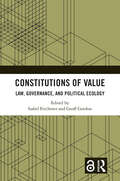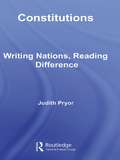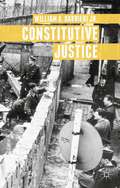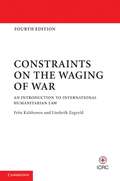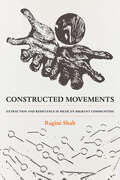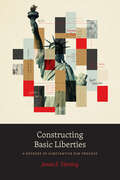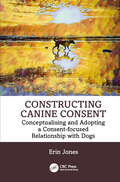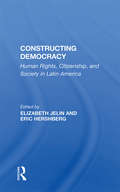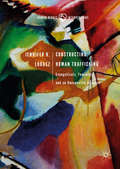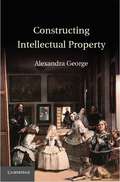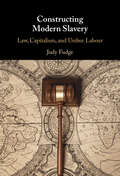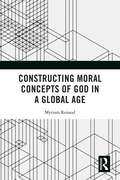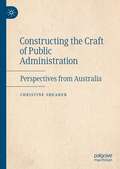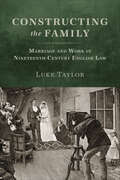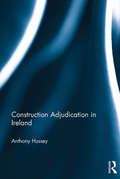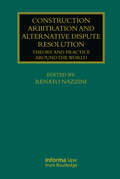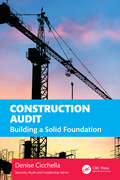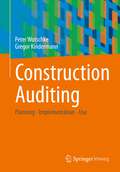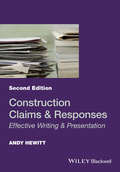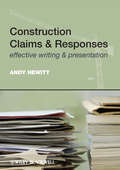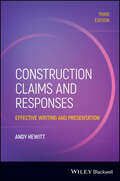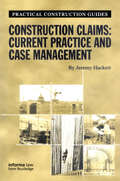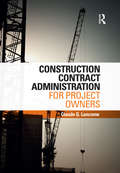- Table View
- List View
Constitutions of Value: Law, Governance, and Political Ecology
by Isabel Feichtner and Geoff GordonGathering an interdisciplinary range of cutting-edge scholars, this book addresses legal constitutions of value. Global value production and transnational value practices that rely on exploitation and extraction have left us with toxic commons and a damaged planet. Against this situation, the book examines law’s fundamental role in institutions of value production and valuation. Utilising pathbreaking theoretical approaches, it problematizes mainstream efforts to redeem institutions of value production by recoupling them with progressive values. Aiming beyond radical critique, the book opens up the possibility of imagining and enacting new and different value practices. This wide-ranging and accessible book will appeal to international lawyers, socio-legal scholars, those working at the intersections of law and economy and others, in politics, economics, environmental studies and elsewhere, who are concerned with rethinking our current ideas of what has value, what does not, and whether and how value may be revalued.
Constitutions: Writing Nations, Reading Difference (Birkbeck Law Press)
by Judith PryorBringing a postcolonial perspective to UK constitutional debates and including a detailed and comparative engagement with the constitutions of Britain’s ex-colonies, this book is an original reflection upon the relationship between the written and the unwritten constitution. Can a nation have an unwritten constitution? While written constitutions both found and define modern nations, Britain is commonly regarded as one of the very few exceptions to this rule. Drawing on a range of theories concerning writing, law and violence (from Robert Cover to Jacques Derrida), Constitutions makes a theoretical intervention into conventional constitutional analyses by problematizing the notion of a ‘written constitution’ on which they are based. Situated within the frame of the former British empire, this book deconstructs the conventional opposition between the ‘margins’ and the ‘centre’, as well as between the ‘written’ and ‘unwritten’, by paying very close, detailed attention to the constitutional texts under consideration. Pryor argues that Britain’s ‘unwritten’ constitution and ‘immemorial’ common law only take on meaning in a relation of difference with the written constitutions of its former colonies. These texts, in turn, draw on this pre-literate origin in order to legitimize themselves. The ‘unwritten’ constitution of Britain can therefore be located and dislocated in postcolonial written constitutions. Constitutions is an excellent addition to the bookshelves of all students of the philosophy of law, political theory, constitutional and administrative law and jurisprudence.
Constitutive Justice
by William BarbieriBoth classical and modern accounts of justice largely overlook the question of how the communities within which justice applies are constituted in the first place. This book addresses that problem, arguing that we need to accord a place to the theory of 'constitutive justice' alongside traditional categories of distributive and commutative justice.
Constraints on Trade in the MENA Region
by Rina Bhattacharya Hirut WoldeA report from the International Monetary Fund.
Constraints on the Waging of War
by Frits Kalshoven Liesbeth ZegveldThis fully revised fourth edition of Constraints on the Waging of War considers the development of the principal rules of international humanitarian law from their origins to the present day. Of particular focus are the rules governing weapons and the legal instruments through which respect for the law can be enforced. Combining theory and actual practice, this book appeals to specialists as well as to students turning to the subject for the first time.
Constructed Movements: Extraction and Resistance in Mexican Migrant Communities (Race, Labor Migration, and the Law #1)
by Ragini ShahA free ebook version of this title is available through Luminos, University of California Press's Open Access publishing program. Visit www.luminosoa.org to learn more. At once theoretically sophisticated and poignantly written, Constructed Movements centers stories from communities in Mexico profoundly affected by emigration to the United States to show how migration extracts resources along racial lines. Ragini Shah chronicles how three interrelated dynamics—the maldistribution of public resources, the exploitation of migrant labor, and the US immigration enforcement regime—entrench the necessity of migration as a strategy for survival in Mexico. She also highlights the alternative visions elaborated by migrant community organizations that seek to end the conditions that force migration. Recognizing that reform without recompense will never right an unjust migratory system, Shah concludes with a forceful call for the US and Mexican governments to make abolitionist investments and reparative compensation to directly counteract this legacy of extraction.
Constructing Basic Liberties: A Defense of Substantive Due Process
by James E. FlemingA strong and lively defense of substantive due process. From reproductive rights to marriage for same-sex couples, many of our basic liberties owe their protection to landmark Supreme Court decisions that have hinged on the doctrine of substantive due process. This doctrine is controversial—a battleground for opposing views around the relationship between law and morality in circumstances of moral pluralism—and is deeply vulnerable today. Against recurring charges that the practice of substantive due process is dangerously indeterminate and irredeemably undemocratic, Constructing Basic Liberties reveals the underlying coherence and structure of substantive due process and defends it as integral to our constitutional democracy. Reviewing the development of the doctrine over the last half-century, James E. Fleming rebuts popular arguments against substantive due process and shows that the Supreme Court has constructed basic liberties through common law constitutional interpretation: reasoning by analogy from one case to the next and making complex normative judgments about what basic liberties are significant for personal self-government. Elaborating key distinctions and tools for interpretation, Fleming makes a powerful case that substantive due process is a worthy practice that is based on the best understanding of our constitutional commitments to protecting ordered liberty and securing the status and benefits of equal citizenship for all.
Constructing Canine Consent: Conceptualising and adopting a consent-focused relationship with dogs
by Erin JonesThe concept of canine consent is far more than simply a buzzword in modern dog training practices. In its current form, consent is a distinctly human concept, designed by humans and for humans. Looking beyond species boundaries can help us not only consider concepts of canine consent and autonomy, but it can also help us to apply these concepts in our everyday interactions with dogs, which is fundamental for any professional working with dogs as well as for everyday dog caregivers. This canine-indexed definition of consent includes a model of five major categories: Touch/interaction-based consent, cooperative care using learned consent behaviours, activity consent, consent-based learning, and substitutive consent. These categories involve a two-way communication system, integration of salient choices, teaching consent behaviours and incorporating existing training protocols that adhere to the Humane Hierarchy of best practices, and an evaluation of dependent decision-making in extenuating circumstances. This book aims to merge the existing literature and new understandings about canine consent to paint a complete picture. It will challenge the current expectations of dogs and dog behaviour in our society with an intention of considering their perspectives, experiences, and emotional needs. It will be important reading for veterinary professionals, dog trainers and behaviourists, those involved in work with therapy dogs, and anybody working with or caring for dogs.
Constructing Democracy: Human Rights, Citizenship, And Society In Latin America
by Elizabeth JelinIn this pathbreaking contribution to debates about human rights, democracy, and society, distinguished social scientists from Latin America and the United States move beyond questions of state terror, violence, and similar abuses to embrace broader concepts of human rights: citizenship, identity, civil society, racism, gender discrimination, and po
Constructing Human Trafficking: Evangelicals, Feminists, and an Unexpected Alliance (Human Rights Interventions)
by Jennifer K. LobaszHuman trafficking has come to be seen as a growing threat, and transnational advocacy networks opposed to human trafficking have succeeded in establishing trafficking as a pressing political problem. The meaning of human trafficking, however, remains an object of significant—and heated—contestation. This project draws upon feminist and poststructuralist international relations theories to offer a genealogy of U.S. neo-abolitionism. The analysis examines activist campaigns, legislative and policy debates, and legislation surrounding human trafficking and the Trafficking Victims Protection Act in order to argue that the dominant US framing of trafficking as prostitution and sex slavery is not as hegemonic as scholars and activists commonly argue. In fact, constructions of human trafficking have become more amenable to reconfiguration, paradoxically in large part because of Evangelical attempts to widen the frame. This is an empirically novel and theoretically rich account of an urgent transnational issue of concern to activists, voters and policymakers around the globe.
Constructing Immigrant "Illegality"
by Cecilia Menjívar Daniel KanstroomThe topic of illegal immigration has been a major aspect of public discourse in the United States and many other immigrant-receiving countries. From the beginning of its modern invocation in the early twentieth century, the often ill-defined epithet of human illegality has figured prominently in the media; in vigorous public debates at the national, state, and local levels; and in presidential campaigns. In this collection of essays, contributors from a variety of disciplines anthropology, law, political science, religious studies, and sociology examine how immigration law shapes immigrant illegality, how the concept of immigrant illegality is deployed and lived, and how its power is wielded and resisted. The authors conclude that the current concept of immigrant illegality is in need of sustained critique, as careful analysis will aid policy discussions and lead to more just solutions.
Constructing Intellectual Property
by Alexandra GeorgeWhat is 'intellectual property'? This book examines the way in which this important area of law is constructed by the legal system. It argues that intellectual property is a body of rules, created by the legal system, that regulate the documented forms of abstract objects, which are also defined into existence by the legal system. Intellectual property law thus constructs its own objects of regulation and it does so through the application of a collection of core concepts. By analyzing the metaphysical structure of intellectual property law and the concepts the legal system uses to construct 'intellectual property', the book sheds new light on the nature of this fascinating area of law. It explains anomalies between social and intellectual property uses of concepts such as authorship - here dubbed 'creatorship' - and originality and it helps to explain the role of intellectual property from a structural (rather than the traditional normative) perspective.
Constructing Modern Slavery: Law, Capitalism, and Unfree Labour
by Judy FudgeModern slavery laws are a response to global capitalism, which undermines the distinction between free and unfree labour and poses intense challenges to state sovereignty. Instead of being a solution, Constructing Modern Slavery argues that modern slavery laws divert attention from the underlying structures and processes that generate exploitation. Focusing on unfree labour associated with international immigration and global supply chains, it provides a novel socio-legal genealogy of the concept 'modern slavery' through a series of linked case studies of influential actors associated with key legal instruments: the United Nations, the United States, the International Labour Organization, the European Union, the United Kingdom, and Walk Free Foundation. Constructing Modern Slavery demonstrates that despite the best efforts of academics, advocates, and policymakers to develop a truly multifaceted approach to modern slavery, it is difficult to uncouple antislavery initiatives from the conservative moral and economic agendas with which they are aligned. This title is also available as Open Access on Cambridge Core.
Constructing Moral Concepts of God in a Global Age
by Myriam RenaudConstructing Moral Concepts of God in a Global Age focuses on what people say and think about God, rather than on arguments about God's existence. It advances a theological method, or step-by-step approach to explore and reframe personal convictions about God and the worldviews shaped by those convictions. Since a moral God is more likely to foster a moral life, this method integrates an ethical check to ensure that understandings of God and their associated worldviews are validly moral. The proposed method builds on the work of twentieth-century theologian Gordon Kaufman during the Kantian phase of his work. It anticipates a person-like God who hears prayers, loves without end, and comforts in times of hardship. To accommodate today’s pluralistic and globalized world, the ethical check integrated in the method is a widely collaborative and vetted global ethic, the Parliament of the World’s Religions "Declaration Towards a Global Ethic." This volume of constructive philosophical theology is written for seminary students, educators, clergy, study groups, and anyone interested in delving more deeply and systematically into understandings of God, whether their own or those of others.
Constructing the Craft of Public Administration: Perspectives from Australia
by Christine ShearerThis book draws on recent empirical research and reports unique insight into the craft of public administration of the most senior echelons of the Australian Public Service (APS).This work is set in the context of a comparative analysis of the significant public sector reforms by successive governments from the 1980s across Westminster polities. Such reforms and the contemporary management ideas on which they were based, including new managerialism and ‘new public management’ (NPM) travelled, were translated and transformed with some elements accepted and others rejected. This book addresses how the most senior public servants in the APS construct their craft today amid such reforms. Chapter two covers the myriad of public sector reforms across Westminster polities. Chapters three and four cover the environments and contemporary management ideas which influence public administration. Chapters five and six showcase the public actors and the responsibilities they execute when they construct their craft. The final chapter provides a conceptual model of the craft of public administration and provides implications for theory and practice.
Constructing the Family: Marriage and Work in Nineteenth-Century English Law
by Luke TaylorIn nineteenth-century England, legal conceptions of work and family changed in fundamental ways. Notably, significant legal moves came into play that changed the legal understanding of the family. Constructing the Family examines the evolution of the legal-discursive framework governing work and family relations. Luke Taylor considers the intersecting intellectual and institutional forces that contributed to the dissolution of the household, the establishment of separate spheres of work and family, and the emergence of modern legal and social ideas concerning work and family. He shows how specific legal-institutional moves contributed to the creation of the family’s categorical status in the social and legal order and a distinct and exceptional body of rules – Family Law – for its governance. Shedding light on the historical processes that contributed to the emergence of English Family Law, Constructing the Family shows how work and family became separate regulatory domains, and in so doing reveals the contingent nature of the modern legal family.
Construction Adjudication in Ireland
by Anthony HusseyThe Construction Contracts Act 2013 introduces adjudication for the construction industry in Ireland for the first time. The essence of adjudication is in providing a means whereby disputes as to payment under a construction contract are resolved quickly and cheaply. The key feature distinguishing adjudication from other processes is that the money found due by the adjudicator must be paid pending the outcome of arbitration or litigation. Its primary function, therefore, is to ensure cash flow for contractors and sub-contractors. Leading construction lawyer Anthony Hussey’s new book is the first to provide a section by section analysis of the Act itself, an analysis of the Code of Practice, and a discussion of the likely constitutional issues to which the legislation will give rise. This practical legal reference is aimed at all those involved in construction contract disputes, be they lawyers, architects, engineers, quantity surveyors, contractors and sub-contractors.
Construction Arbitration and Alternative Dispute Resolution: Theory and Practice around the World (Construction Practice Series)
by Renato NazziniThis book provides comprehensive, rigorous and up-to-date coverage of key issues that have emerged in the first quarter of the 21st Century in transnational construction arbitration and alternative dispute resolution (ADR). Covering four general themes, this book discusses: the increasing internationalisation of dispute resolution in construction law; the increasing reliance on technology in the management of construction projects and construction arbitration/ADR; the increasing prominence of collaborative contracting in construction and infrastructure projects; the increasing importance of contractual adjudication such as dispute boards in construction and infrastructure projects; the increasing prevalence of statutory adjudication mechanisms across the world; and the greater incidence of investment disputes and disputes against States and State entities over construction and infrastructure concessions and agreements. Tapping on their substantial expertise in practice and in research, the contributor team of senior practitioners and academics in the area of construction law and dispute resolution provide readers with information that balances an intellectually rigorous academic contribution against the backdrop of real concerns raised in practice. Construction Arbitration and Alternative Dispute Resolution is an invaluable resource for practitioners in the field, academics in arbitration and construction law, and post-graduate students in construction law and dispute resolution.
Construction Audit: Building a Solid Foundation (ISSN)
by Denise CicchellaConstruction Audit is becoming more and more prevalent, and organizations are appreciating its importance. Learning the basics of construction auditing can provide valuable knowledge and skills for professionals and students in the construction industry, offering insights into financial management, risk mitigation, compliance and overall project oversight.This book is not just for auditors, however. It could be used by project managers, integrity monitors, construction managers and anyone else who wants to understand the elements that go into creating a successful project. Legal teams involved in contracting and overpayment recovery will also benefit.This book: Walks you through all phases of construction, starting with project inception. It will guide the reader through all the processes and the risks in each of these. Will guide the reader through the many challenges they will face throughout the life of the project. This book provides real-life solutions to common problems in construction. Introduces project management techniques; while not concentrating on a special methodology, the book builds on project management fundamentals. Understanding this will help enable the reader to talk to project managers more effectively. Defines the components of a successful project and gives the reader the tools needed to ensure these components. Uses real-life examples of control breakdowns, errors or fraud. Will help readers build an audit strategy and plan by understanding risks and effective controls that can be implemented to mitigate risk. Whether tackling your first project or your 21st project, this book will help you think outside the box and understand the finite processes and pieces of your project. There is always room for something new, new perspectives or improvement, and this book will help you find it.
Construction Auditing: Planning - Implementation - Use
by Peter Wotschke Gregor KindermannThe task of construction auditing is to check construction projects for compliance and legality as well as economic efficiency. Based on the development process of a construction project - from the idea to the operation - this technical book shows how the project execution must be planned and documented in order to withstand an audit. The book provides an overview of national and international regulations and derives concrete recommendations for action from practical examples..
Construction Claims and Responses: Effective Writing and Presentation
by Andy HewittA practical, step-by-step guide for contracts managers, commercial managers, project managers, quantity surveyors, engineers and architects on the preparation of and responses to construction claims. Everyone involved in the preparation or review of construction claims should have this book to hand. The book examines the different types of claim common to construction contracts and presents a step-by-step guide to demonstrate the process of building up the submission of a claim and covers: Various types of claim. How the claim may be split into sections dealing with the details of the contract, the cause, the effect, entitlement and quantum. What this section is attempting to demonstrate or achieve and why. What should be included within the section and why. Worked examples of typical claims and responses with sample wording.
Construction Claims and Responses: Effective Writing and Presentation
by Andy HewittFeaturing a Foreword by Roger Knowles FRICS, FCIArb, FQSi, Barrister The book discusses the different types of claim common to construction contracts and presents a step-by-step guide which demonstrates the process of building up the submission of a claim. It includes guidelines as to how to set out the claim, section by section in a logical manner to ensure that the essentials of a successful claim are included. Worked examples of claims for variations, extensions of time and additional payment are included together with sample wording showing precisely how the claim may be presented in a manner which will lead the reviewer to a logical conclusion - or at least contain a persuasive argument to support the claimant’s case. The vast majority of claims are managed without the need to resort to case law or legal matters. Construction Claims: effective writing & responses therefore discusses what the claim is trying to achieve and how to do this in a logical and persuasive manner This is a practical, hands-on guide for the construction industry professional which explains how to approach the preparation of the claim document, what topics to cover, how to present the essential elements and how to compile the submission document into a user friendly and comprehensive document. For those whose job it is to review such submissions, it advises how to prepare responses which set out the respondent’s counter arguments, points of view and determinations. The guide covers: The various types of claim. How the claim may be split into sections dealing with the details of the contract, the cause, the effect, entitlement and quantum. What this section is attempting to demonstrate or achieve and why. What should be included within the section and why. Worked examples of typical claims and responses with sample wording.
Construction Claims and Responses: Effective Writing and Presentation
by Andy HewittThe latest and most up-to-date edition of the best hands-on guide to construction claims and claims response preparation In the newly revised third edition of Construction Claims and Responses: Effective Writing and Presentation, renowned construction claims and disputes consultant Andy Hewitt delivers yet another authoritative and practical discussion of how to prepare and respond to construction claims. Covering a variety of different types of claims – including variations, extensions of time, and additional payment – the book demonstrates an effective step-by-step process of building up a claim by breaking it down into manageable sections: contract details, causes, effects, entitlement, and quantum. You’ll find worked examples of typical claims, complete with sample wording, as well as updated and simplified examples of responses, additional detail on cost calculations, and updates to material to maintain compliance with FIDIC 2017. Readers will also discover: A thorough introduction to properly constituted and presented claims, including the establishment of contractual entitlement and comprehensive documentationComprehensive explorations of what constitutes sufficient cause and effect for a construction claimRevised and clarified worked examples of commonly made construction claims and responsesComplete discussions of accurate quantum calculations Perfect for all construction project personnel around the world involved in the preparation of construction claims, Construction Claims and Responses will also benefit those preparing responses to such claims, as well as quantity surveyors, contracts managers, project managers, claims consultants, commercial managers, engineers, architects, and adjudicators.
Construction Claims: Current Practice and Case Management (Practical Construction Guides)
by Jeremy HackettThis book discusses practices in preparing and defending claims, bringing in funding, insurance and design team issues. It brings together the basic knowledge from the principal post-1996 legislation required by practitioners, together with an outline of the options and risks.
Construction Contract Administration for Project Owners
by Claude G. LancomeConstruction Contract Administration for Project Owners is aimed at public and private owners of real estate and construction projects. The book is intended to assist owners in their contractual dealings with their designers and their contractors. Most owners are not primarily in the business of designing and building facilities. The fact that their primary business is not design and construction places them at a disadvantage when negotiating, drafting, and administering design agreements and construction contracts because their designers and contractors use these documents every day. This book is intended to assist owners to redress this imbalance by equipping owners to draft and administer contracts so as to protect their interests. The book is aimed at owner personnel with all levels of knowledge in the business of managing projects. It can serve as a comprehensive introduction to drafting and administering design agreements and construction contracts for beginners. For intermediate level personnel, it can serve as a manual to be read to enhance the reader’s skills in this area. For the sophisticated project management professional, it can serve as a resource to be consulted in connection with very specific issues as they arise on a project.
